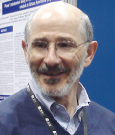Few people have impacted cancer clinical research in the past quarter century as much as Mark Green. His expertise in lung cancer and clinical trial design led to the successful completion of seminal studies combining radiation and chemotherapy that forever changed the management of patients with early-stage lung cancer,” said past ASCO president Richard Schilsky, MD, in memory of his friend and colleague Mark R. Green, MD, who died on February 23. He was 70 years old.
Dr. Green was born on January 13, 1945, in Norwalk, Connecticut. The son of a physician, Dr. Green decided early in life that he also wanted to pursue a career in medicine. After graduating from high school, Dr. Green entered Harvard University, where he received his BA and MD degrees. He then went to Beth Israel Hospital for his residency and ended up doing the latter part at the National Cancer Institute, which solidified his decision to enter the field of oncology. After completing his residency, Dr. Green went out West, doing his oncology fellowship at Stanford University Medical Center.
In 1976, Dr. Green joined the faculty at the University of California, San Diego (UCSD), where he remained for 14 years, during which time he held many leadership roles including Head of the Division of Hematology/Oncology and Director of UCSD Cancer Center, which he successfully led to its first 5-year core grant. While at UCSD, Dr. Green also held the Edwin and Evelyn Tasch Professorship in Cancer Research, which was established in his honor.
A Lasting Influence in Lung Cancer
Dr. Green is widely recognized for his early investigations of induction chemotherapy and treatment of lung cancer as a systemic disease. These investigations led to the identification of induction chemotherapy followed by radiation as superior to radiotherapy alone for patients with locoregionally advanced unresectable non–small cell lung cancer (NSCLC).
“Dr. Mark Green was one of the most influential lung cancer medical oncologists in the past 50 years. He had a command of the oncologic literature that was second to none. He was one of the few doctors I have known who was not only able to quote chapter and verse about the latest cancer research, but he was also able to synthesize it for your particular patient—a marvelous combination and one that is rare in medicine,” commented long-time colleague Gerard A. Silvestri, MD, MS, FCCP, Hillenbrand Professor of Thoracic Oncology at the Medical University of South Carolina.
He is best known for his engaged leadership and intellectual contributions in the Alliance in Clinical Trials for Oncology (formerly Cancer and Leukemia Group B [CALGB]). He was the longest-serving Chair of the Respiratory Committee of CALGB, a position he held for more than 20 years, and also served as Vice Chairman of CALGB from 1995 to 2007, while Dr. Richard Schilsky was Chairman. Under his leadership, CALGB also investigated the role of adjuvant chemotherapy for stage 1B NSCLC, the timing of concurrent radiotherapy for limited-stage small cell lung cancer, and the role of new drugs (including the taxanes, gemcitabine, and topotecan).
‘A True Mentor and a Mensch’
Dr. Green served as a mentor for several investigators who are active in lung cancer research today. Colleague Ramaswamy Govindan, MD, recalled Dr. Green. “He was truly a great role model for me. To this day, I am inspired by his encyclopedic knowledge, sharp wit, vision, passion for excellence, and kindness toward others. The oncology community has lost an invaluable leader.”
Another colleague, Rogerio Lilenbaum, MD, remarked, “Mark Green was the consummate researcher—passionate, inquisitive, analytic, and unrelenting in the pursuit of excellence. Mark inspired an entire generation of clinical researchers, and his premature departure leaves a vacuum in the hearts of everyone he has touched. He will be remembered as one of the greats—a true mentor and a mensch.”
In 1996, Dr. Green was appointed the Mary M. Gilbreth Chair of Clinical Oncology and Director of the Hollings Cancer Center at the Medical University of South Carolina (MUSC), serving in these posts through 2000. He retired from the full-time faculty as a Professor Emeritus in 2004, took on the roles of Medical Director for the Network for Medical Communication and Research and Clinical Professor of Medicine at MUSC.
Recently, Dr. Green served as Chief Medical Officer of Xcenda, a position he held since 2007. A representative from Xcenda remarked on Dr. Green’s death, “Those of us who had the honor and privilege of knowing and working with Dr. Green will fondly remember his intellectual brilliance, his vast knowledge of clinical oncology, his fiery passion for a good debate, and, above all, his genuine compassion for others.”
Dr. Green has more than 300 scientific publications to his credit and coauthored The Comprehensive Textbook of Thoracic Oncology. He is survived by his wife, two daughters, and two brothers. ■


